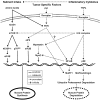Inflammatory burden and amino acid metabolism in cancer cachexia
- PMID: 19057191
- PMCID: PMC2742684
- DOI: 10.1097/MCO.0b013e32831cef61
Inflammatory burden and amino acid metabolism in cancer cachexia
Abstract
Purpose of review: Cancer cachexia is associated with marked alterations in skeletal muscle protein metabolism that lead to muscle wasting and, in some cases, death. The inflammatory response elicited by cancer is a likely, if not primary, mediator of these alterations. This review focuses on the possible relationship between inflammatory signaling and altered amino acid metabolism in cancer.
Recent findings: Loss of skeletal muscle in cancer patients can potentially be due to anorexia and early satiety, reduced muscle protein synthesis, and/or increased muscle protein breakdown. Inflammation has been associated with each of these mechanisms. Effects on appetite appear to be mediated by the melanocortin system in the hypothalamus. Studies in animal models of cachexia suggest that modulation of orexigenic and anorexigenic pathways in this system may improve nutrient consumption. Inflammatory cytokines such as IL-6 and TNF-alpha are likely to contribute to the effects of inflammation on muscle protein metabolism through several pathways.
Summary: Limited studies in humans suggest that targeted anti-inflammatory and nutritional interventions may ameliorate the net catabolic effect on skeletal muscle protein metabolism. Future studies of the precise mechanism of muscle protein loss, as well as novel or combination therapies to inhibit inflammation and promote anabolism, are warranted.
Figures

References
-
- Tan HL, Fearon KCH. Cachexia: prevalence and impact in medicine. Curr Opin Clin Nutr Metab Care. 2008;11:400–407. The study places cancer cachexia in its context within the broad category of cachexia. - PubMed
-
- Morley JE, Thomas DR, Wilson M-MG. Cachexia: pathophysiology and clinical relevance. Am J Clin Nutr. 2006;84:735–743. - PubMed
-
- Fearon KC, Voss AC, Hustead DS CB for the Cancer Cachexia Study Group. Definition of cancer cachexia: effect of weight loss, reduced food intake, and systemic inflammation on functional status and prognosis. Am J Clin Nutr. 2006;83:1345–1350. - PubMed
-
- Ahlberg K, Ekman T, Gaston-Johansson F, Mock V. Assessment and management of cancer-related fatigue in adults. Lancet. 2003;362:640–650. - PubMed
-
- Skipworth RJE, Stewart GD, Dejong CHC, et al. Pathophysiology of cancer cachexia: much more than host-tumor interaction? Clin Nutr. 2007;26:667–676. Provides good description and discussion of the acute-phase response elicited in cancer cachexia. - PubMed
Publication types
MeSH terms
Substances
Grants and funding
LinkOut - more resources
Full Text Sources
Other Literature Sources
Research Materials

